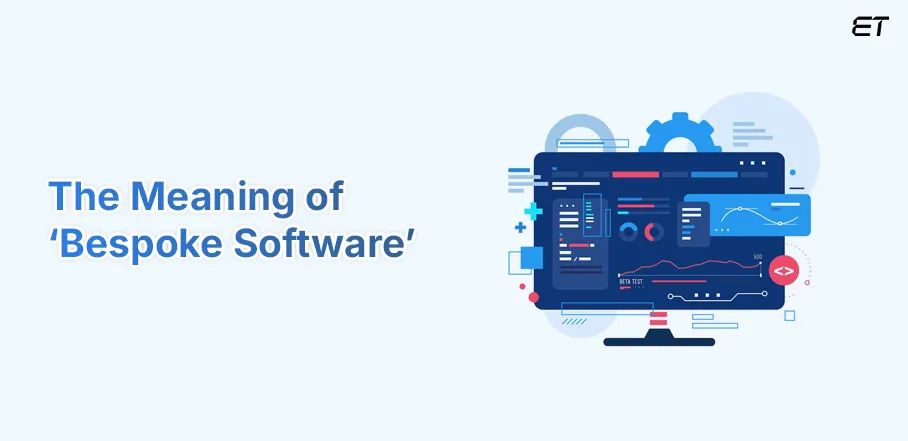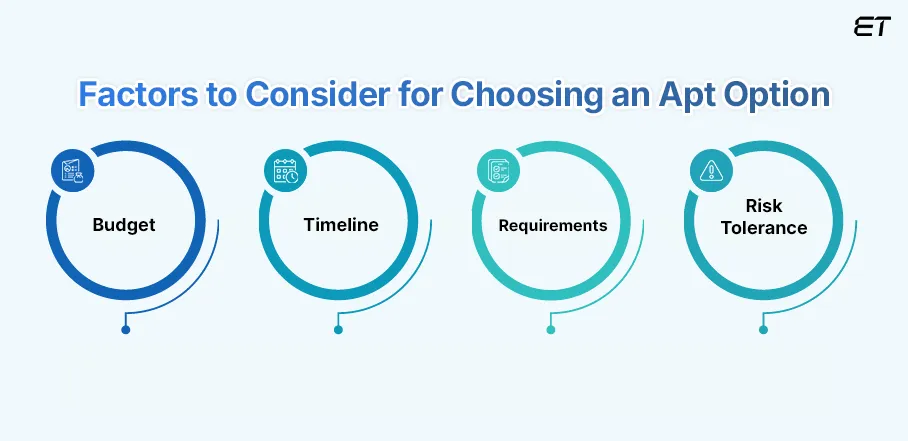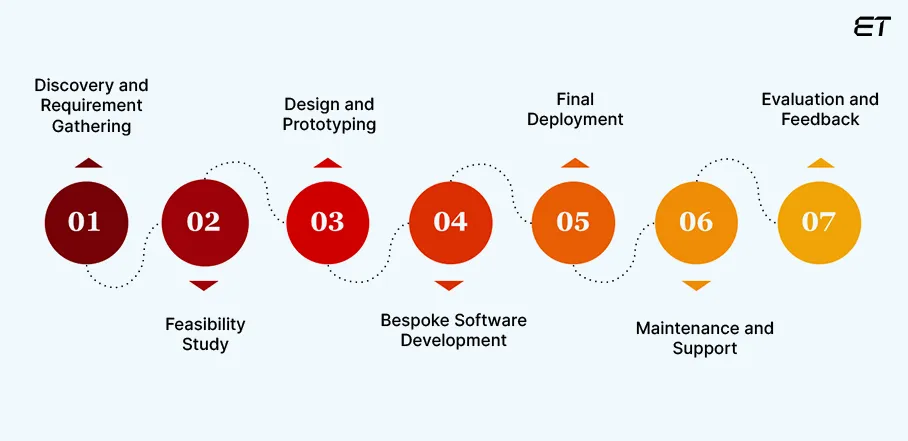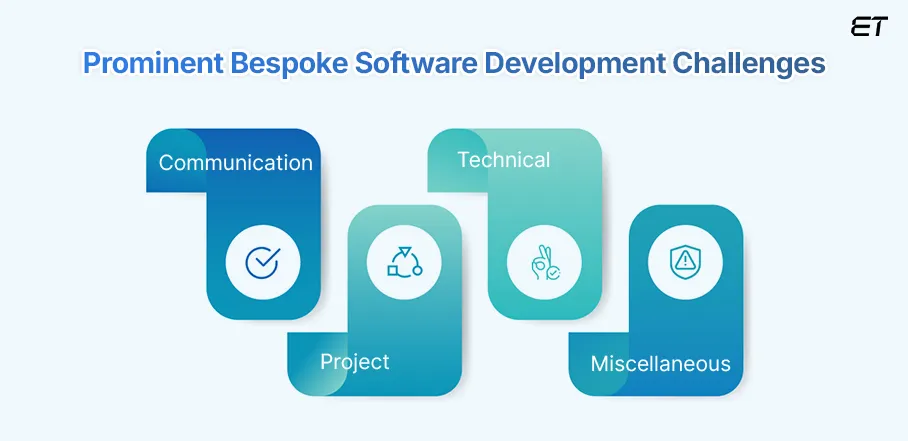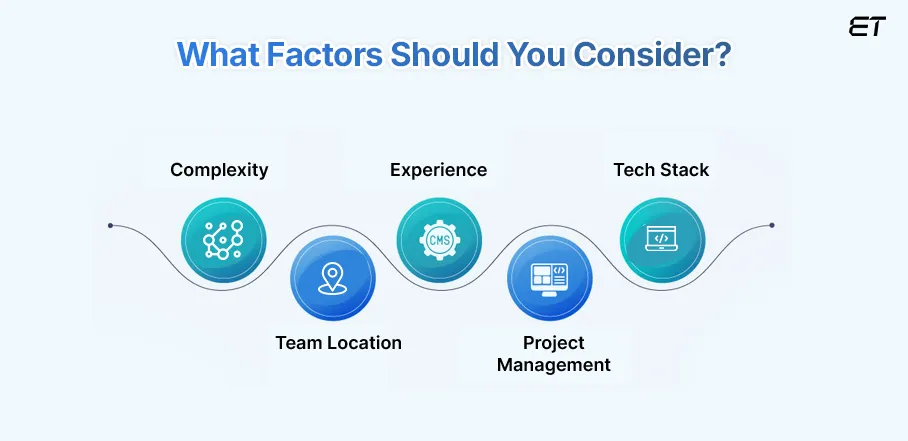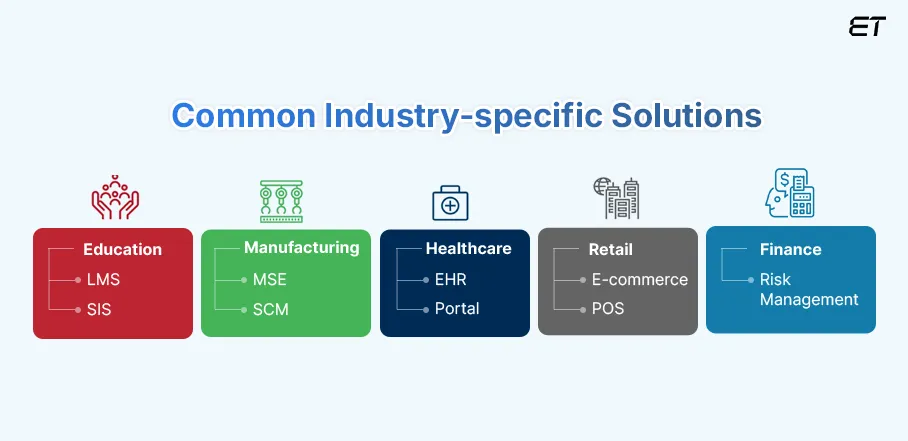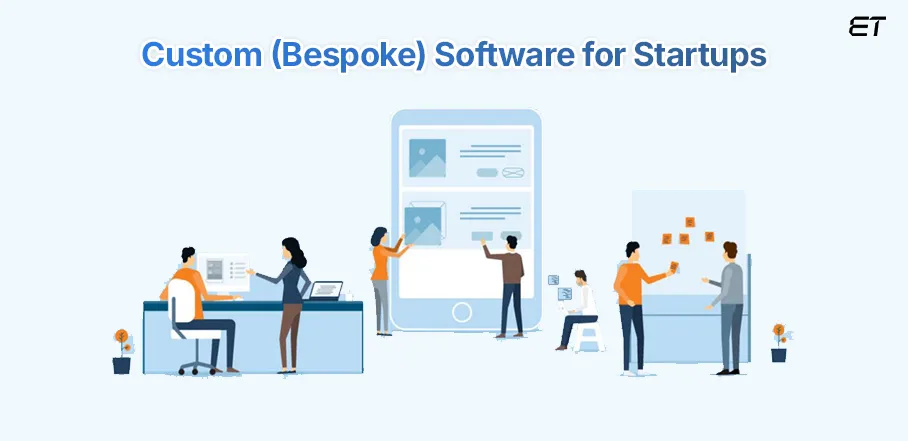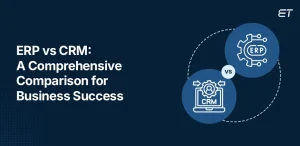Bespoke software development is an approach of developing a custom solution for meeting unique business requirements. Companies outsource bespoke software solutions to improve efficiency and gain a competitive advantage.
With the software industry booming at USD 702 billion, it makes sense to develop your custom software and streamline business processes to a great extent.
By developing bespoke solutions, you can benefit from features that aren’t available in off the shelf software. Read ahead to know all about this unique approach to custom software development and how you can overcome the common challenges.
What is Bespoke Software?
The term, ‘bespoke’ has a simple meaning. It literally means, ‘made for a particular user or customer. ‘
Simply speaking, bespoke software are custom software solutions that a development team builds to meet your special needs. Here are some of the common use cases that portray why companies invest in creating bespoke software solutions:
- Enterprise resource planning (ERP) systems
- Data analysis tools
- E-commerce platforms
- Customer relationship management (CRM) systems
Overall, bespoke development ensures you get tailored software that can help your team combat various practical challenges.
Definition and Meaning
| Bespoke software development, also called custom software development, is the process of creating customized solutions to meet the specific needs of an individual or business. Unlike off-the-shelf software (designed to fit a wide range of users), a bespoke solution is built from scratch to address unique requirements. |
Save your invaluable time. Request a proposal for your bespoke software from us.
Benefits of Bespoke Software Solutions
From improving operational efficiency to building scalable solutions, bespoke software development proves profitable for various reasons. Here are some of the main advantages of such tailored solutions.
Customization and Flexibility
Customization and flexibility allow you to tailor software solutions to their unique needs and adapt to changing circumstances. Let’s decode each attribute in a couple of points.
Customization
- Tailored to Specific Needs: Bespoke software is designed to meet the exact requirements of a business, ensuring it aligns perfectly with their workflow and processes. So, developing bespoke software eliminates the need for workarounds or compromises that often arise when using off-the-shelf solutions
- Integration with Existing Systems: You can integrate bespoke software seamlessly with existing systems and applications, improving efficiency and data management. This ability reduces the need for multiple systems and manual data entry
Flexibility
- Scalability: Bespoke software can easily be modified to accommodate future growth or changes in business needs. This trait ensures that your software remains relevant and effective as the business evolves
- ‘Adaptability to Changing Requirements: You can adapt bespoke software to new regulations, industry trends, or changes in market conditions. This flexibility allows you to stay competitive and compliant
- Customizable User Interface: The user interface (UI) of bespoke software can be designed to match the preferences and workflows of employees, improving user satisfaction and productivity
By understanding the importance of customization and flexibility, you can make informed decisions about whether bespoke software development is the right choice for your needs.
Improved Efficiency and Productivity
Bespoke software can enhance efficiency and productivity within your organization. Here’s a more detailed breakdown:
Automation of Repetitive Tasks
- Streamlining processes: By automating routine tasks, you can reduce manual labor, eliminate errors, and free up employees to focus on more strategic and value-added activities
- Increased throughput: Automation can speed up processes, leading to increased output and faster turnaround times
Tailored Workflows
- Optimized processes: Bespoke software can be designed to align perfectly with an organization’s specific workflows, eliminating inefficiencies and bottlenecks
- Reduced manual intervention: By automating steps in the workflow, you can minimize human error and reduce the need for manual data entry
Reduced Errors
- Data accuracy: Bespoke software can be programmed to validate data and prevent errors, ensuring that information is accurate and reliable
- Quality control: Automated quality checks can identify and correct issues early in the process, reducing the need for rework
Improved Decision Making
- Real-time data: Bespoke software can provide real-time data and analytics, enabling you to make informed decisions based on accurate and up-to-date information
- Predictive analytics: By analyzing historical data and identifying trends, bespoke software can help anticipate future needs and make proactive decisions
Enhanced Collaboration
- Centralized platform: A custom software can provide a centralized platform for teams to collaborate and share information, improving communication and reducing silos
- Real-time updates: Changes made to data or processes can be reflected across the organization, ensuring everyone is working with the latest information
In essence, bespoke software can help achieve improved efficiency and productivity by:
- Automating repetitive tasks
- Optimizing workflows
- Reducing errors
- Providing real-time data
- Enhancing collaboration
By leveraging these benefits, you can streamline operations, reduce costs, and gain a competitive edge.
Want to experience all these benefits? Hire our team of vetted and certified developers without hassle.
Long-term Cost Effectiveness
While the initial development costs of bespoke software may be higher than off-the-shelf solutions, the long-term benefits outweigh the upfront investment. Here’s a breakdown of how bespoke software can be more cost-effective in the long run.
Reduced Maintenance Costs
- Tailored design: Bespoke software is designed to fit the specific needs of a business, minimizing the need for frequent updates or customizations
- Fewer bugs and glitches: Custom-built software is more stable and reliable, reducing the need for ongoing maintenance and bug fixes
- Integration with existing systems: Bespoke software can be integrated with other systems, reducing the complexity of managing multiple applications
Increased Efficiency and Productivity
- Streamlined workflows: As discussed earlier, bespoke software can automate tasks, optimize workflows, and reduce errors, leading to increased efficiency and productivity
- Reduced downtime: A well-designed bespoke software solution can minimize downtime and disruptions, ensuring that the business can continue to operate smoothly
Scalability
- Growth accommodation: Bespoke software can be easily expanded or modified to accommodate future growth or changes in business needs, avoiding the need for costly software replacements
- Adaptability: Bespoke software can be adapted to new technologies, regulations, or market trends, ensuring that the business remains competitive
Overall, you can make informed decisions about whether bespoke software development is the right investment for your future after assessing all these facets.
Enhanced Security
Bespoke software offers several advantages when it comes to security. Let’s break down each benefit one aspect at a time.
Tailored Security Measures
- Risk assessment: Bespoke software developers can conduct a thorough risk assessment to identify potential vulnerabilities and tailor security measures accordingly
- Customizable controls: Security controls can be implemented based on the specific needs and requirements of the business, ensuring that only authorized users have access to sensitive data
Data Protection
- Sensitive data encryption: Bespoke software can incorporate advanced encryption techniques to protect sensitive data, even if the system is compromised
- Access controls: Granular access controls can be implemented to limit access to specific data or functions based on user roles and permissions
Compliance with Regulations
- Industry-specific standards: Bespoke software can be designed to comply with industry-specific regulations, such as GDPR, HIPAA, or PCI DSS
- Regular audits and updates: Regular security audits and updates can help ensure that the software remains compliant with evolving regulations
Proactive Threat Mitigation
- Vulnerability assessments: Regular vulnerability assessments can identify and address potential security weaknesses before they are exploited by malicious actors
- Incident response plans: Bespoke software can be designed with built-in incident response plans to help you quickly contain and mitigate security breaches
Reduced Attack Surface
- Minimal third-party components: Bespoke software typically relies on fewer third-party components, reducing the potential attack surface
- Custom-built security features: Security features can be designed and implemented specifically for the software, minimizing the risk of vulnerabilities
Continuous Monitoring and Updates
- Real-time monitoring: Bespoke software can be monitored in real-time for signs of suspicious activity or security breaches
- Regular updates: Security patches and updates can be applied promptly to address vulnerabilities and keep the software secure
All in all, bespoke software can provide enhanced security by offering tailored measures, protecting sensitive data, ensuring compliance with regulations, mitigating threats proactively, and reducing the attack surface. By investing in bespoke software, you can safeguard your valuable assets and protect their reputation.
Protection of Intellectual Property
Bespoke software can provide significant benefits in terms of intellectual property (IP) protection. Here are the main aspects that justify this advantage.
Ownership and Control
- Full ownership: When you invest in bespoke software development, you become the sole owner of the software, including all intellectual property rights
- Control over source code: You also have complete control over the source code of your bespoke software, allowing them to make modifications or enhancements as needed
Differentiation from Competitors
- Unique features: Bespoke software can incorporate unique features and functionalities that differentiate a business from its competitors
- Competitive advantage: By owning proprietary software, you can gain a competitive edge in the marketplace
Trade Secrets Protection
- Confidentiality: Bespoke software can be developed in a way that protects trade secrets and proprietary information
- Limited access: Access to the software can be restricted to authorized personnel, preventing unauthorized disclosure of sensitive information
Reduced Reliance on Third-Party Vendors
- Vendor lock-in: By owning the software, you can avoid vendor lock-in and the associated risks of relying on third-party vendors for critical systems
- Flexibility: You have greater flexibility to modify or enhance the software without relying on external vendors
Legal Protection
- Copyright protection: Bespoke software is automatically protected by copyright law, giving the owner exclusive rights to reproduce, distribute, and modify the software
- Patents: In some cases, it may be possible to obtain a patent for innovative features or algorithms incorporated into bespoke software
At eLuminous, we keep client data and security on the forefront. Fill our NDA-proof form to get in touch and develop your bespoke software.
Bespoke Software vs. Off-the-Shelf Solutions
When considering software solutions for a business, one of the primary decisions to be made is whether to opt for a bespoke (custom) software solution or an off-the-shelf (OTS) solution. Each approach has its own advantages and disadvantages, and the best choice for a particular organization depends on its specific needs, budget, and timeline.
Key Differences
The following table gives you a quick look at the major differences between the two solutions. Keep this table handy before approaching a company for bespoke software development.
| Feature | Bespoke Software | Off-the-Shelf Software |
| Customization | Highly customizable to meet specific needs | Limited customization options |
| Flexibility | Easily adaptable to changes in business requirements | Less flexible, may require workarounds |
| Cost | Higher initial cost, but potentially more cost-effective in the long run | Lower initial cost, but may have higher ongoing costs |
| Development Time | Longer development time | Shorter implementation time |
| Risk | Higher risk of project delays or cost overruns | Lower risk of project delays or cost overruns |
| Ownership | Full ownership of the software | No ownership of the software |
| Intellectual Property | Protects proprietary information | Limited protection of intellectual property |
| Integration | Seamless integration with existing systems | May require workarounds or additional integrations |
| Competitive Advantage | Can provide a significant competitive advantage | May not offer a significant competitive advantage |
| Vendor Lock-in | No vendor lock-in | May be subject to vendor lock-in |
Bespoke software is developed from scratch to meet the unique requirements of a specific organization. It offers a high degree of customization and flexibility, allowing you to tailor the software to your exact needs.
Key advantages of bespoke software are as follows:
- Customization: Bespoke software can be precisely tailored to fit the specific workflows, processes, and requirements of an organization
- Flexibility: It can be easily modified or expanded to accommodate future growth or changes in business needs
- Integration: Bespoke software can be integrated with existing systems and applications, improving efficiency and data management
- Intellectual property: Bespoke software can be considered intellectual property, providing a competitive advantage and protecting proprietary information
However, there are some disadvantages of bespoke software as well. Here are main ones:
- Higher initial cost: The initial development costs of bespoke software are generally higher than off-the-shelf solutions
- Longer development time: Creating bespoke software can take longer than implementing an OTS solution
- Potential risks: There is a risk of project delays or cost overruns if the development process is not managed effectively
Off-the-shelf software is a pre-built solution that is designed to meet the needs of a wide range of users. It is available at a lower cost than bespoke software and can be implemented more quickly.
Here are the key advantages of off-the-shelf (OTS) software:
- Lower initial cost: OTS software is typically less expensive than bespoke software
- Faster implementation: OTS solutions can be implemented more quickly than bespoke software, as they are already pre-built
- Reduced risk: The risk of project delays or cost overruns is lower with OTS solutions
However, the following disadvantages of off-the-shelf software make it challenging for modern companies:
- Limited customization: OTS software may not meet all the specific needs of an organization
- Vendor lock-in: You may become dependent on the vendor for updates, support, and maintenance
- Lack of competitive advantage: OTS software is widely available, so it may not provide a significant competitive advantage
So, how can you choose the most suitable solution? Read the next section to get a detailed answer.
Choosing the Right Solution
The decision of whether to choose bespoke or off-the-shelf software depends on several factors, including:
- Budget: Off-the-shelf software is generally less expensive, but bespoke software may be more cost-effective in the long run
- Timeline: Bespoke software can take longer to develop, but OTS software may require significant customization to meet specific needs
- Requirements: If an organization has unique or complex requirements, bespoke software may be the best option
- Risk tolerance: Businesses with a higher risk tolerance may be more willing to invest in bespoke software
By considering these factors, you can make an informed decision about whether bespoke or off-the-shelf software is the best fit for your needs.
The Bespoke Software Development Process
The bespoke software development process involves the following stages:
- Discovery and Requirement Gathering
- Feasibility Study
- Design and Prototyping
- Bespoke Software Development
- Final Deployment
- Maintenance and Support
- Evaluation and Feedback
In this section, you will get brief insights of every stage.
1. Discovery and Requirements Gathering
This stage starts with a detailed discussion with the client to understand their business goals, objectives, and specific requirements.
The experts conduct identification of the key features, functionalities, and performance criteria that the software must meet. Gathering input from various stakeholders within the organization ensures that the software aligns with their needs.
2. Feasibility Study
The second step involves evaluation of the technical feasibility of the project, including hardware, software, and infrastructure requirements.
Assessment of the potential costs and benefits of the project helps determine its viability. One of the main activities in this stage is identification and mitigation of potential risks associated with the project.
3. Design and Prototyping
In this stage, developers start development of a high-level design for the software, outlining the components, modules, and interfaces.
At the same time, designers create wireframes and mockups to visualize the user interface and user experience. Development of a working prototype helps demonstrate the functionality and usability of the software.
4. Bespoke Software Development
This essential stage involves writing the software code using appropriate programming languages and tools.
Thorough testing of the software becomes crucial to identify and fix bugs and defects. You should invest in reliable QA services in this step for ensuring that the software meets the specified quality standards and requirements.
Hire dedicated developers to build your customized solution today!
5. Final Deployment
This step involves installation of the software on the client’s servers or infrastructure.
Developers also conduct configuration of the software to match the specific needs and environment of the client. Providing training to users on how to use the software effectively is vital in this step before final deployment.
6. Maintenance and Support
Conducting regular updates, patches, and bug fixes ensures the bespoke software remains functional and secure.
So, in this stage, providing assistance to users who encounter problems or issues with the software becomes crucial. Implementing new features or functionalities based on user feedback and changing business requirements becomes the responsibility of the IT team.
7. Evaluation and Feedback
The final step includes assessing the software’s performance against the original requirements and objectives. Gathering feedback from users to identify areas for improvement is vital in this stage.
Based on this data, this step involves making necessary adjustments to the software based on evaluation and feedback.
By following this structured process, you can ensure that their bespoke software development projects are successful and deliver the desired outcomes.
Challenges and Best Practices
Bespoke software development can present certain challenges. By understanding them and adopting proven best practices, you can mitigate potential risks and ensure successful project outcomes.
Common Challenges
Here are some of the most prominent challenges that you can face:
- Communication Gaps: Lack of clarity between clients and developers can lead to project delays or deliverable mismatches
- Scope Creep: The project scope may expand over time, leading to increased costs, delays, and potential quality issues
- Technical Complexity: Bespoke software can involve complex technical challenges, requiring skilled developers and specialized tools
- Resource Constraints: Limited resources, such as budget, time, or personnel, can hinder the development process and impact project outcomes
- Changing Requirements: Business needs can evolve during the development process, leading to changes in the project scope or requirements
By following certain best practices, you can overcome these challenges effectively.
Best Practices
Here are some quick solutions that you can implement to make the most out of bespoke software development:
- Clear Communication: Establish open and effective communication channels between clients and developers to ensure clear understanding of project goals, requirements, and expectations
- Agile Development Methodology: Adopt an agile methodology, such as Scrum or Kanban, to promote flexibility, iterative development, and continuous feedback
- Risk Management: Identify and mitigate potential risks throughout the project lifecycle to prevent unexpected challenges and delays
- Collaboration and Teamwork: Foster a collaborative environment between clients, developers, and other stakeholders to ensure that everyone is working towards a common goal
- Change Management: Have a plan for managing changes in project requirements to minimize disruptions and avoid scope creep
- Quality Assurance: Implement rigorous quality assurance processes to ensure that the software meets the specified standards and requirements
- Regular Reviews and Feedback: Conduct regular reviews and obtain feedback from clients and stakeholders to ensure that the project is on track and meeting expectations
- Prioritize Features: Prioritize features based on their importance and value to the business to ensure that the most critical functionalities are delivered first
By addressing these challenges and following best practices, you can increase the chance of successful bespoke software development projects and achieve desired outcomes.
Want to know the top 10 software development best practices? Then, explore our in-depth blog today.
Overcoming Common Challenges: An Overview
Here’s a tabular synopsis of the solutions that you should consider when planning bespoke software development.
| Challenge | Solution |
| Communication Gaps | Clear and concise communication, regular meetings, detailed documentation |
| Scope Creep | Define the scope clearly, prioritize features, change management process |
| Technical Complexity | Experienced team, proof of concept, continuous learning |
| Resource Constraints | Prioritization, outsourcing, efficient project management |
| Changing Requirements | Flexibility, iterative development, version control |
Choosing the Right Bespoke Software Development Partner
Here’s a flowchart that depicts the straightforward process of selecting the best partner for bespoke software development.
Start
↓
Define Your Needs and Requirements
Clearly articulate your business goals, objectives, and specific software requirements
Identify the key features, functionalities, and performance criteria that the software must meet
↓
Research Potential Partners
Conduct online research to identify potential partners
Look for partners with experience in your industry or a similar field
Evaluate their technical expertise and portfolio of previous projects
Check their online reputation and reviews
↓
Assess Communication and Collaboration
Evaluate the partner’s communication style and their ability to collaborate effectively
Assess cultural fit to ensure a harmonious working relationship
↓
Evaluate Project Management Capabilities
Inquire about the partner’s project management methodology and their experience delivering projects on time and within budget
Evaluate their risk management approach and their ability to identify and mitigate potential challenges
Assess their quality assurance processes, including testing methodologies and tools
↓
Gather References and Testimonials
Request references from previous clients to get firsthand insights into the partner’s performance and reliability
Read online reviews and testimonials to gauge the partner’s reputation
↓
Compare Pricing and Contract Terms
Understand the partner’s pricing model, whether it is fixed-price, time-and-material, or a hybrid approach
Carefully review the contract terms to ensure that your rights and interest are protected
↓
Consider Geographic Location
Evaluate time zone differences to ensure effective communication and collaboration
Be aware of any cultural differences that may impact the project
↓
Request Proposals
Request proposals from shortlisted partners, outlining your specific requirements and expectations.
↓
Conduct Interviews
Interview potential partners to assess their understanding of your project, their approach to development, and their team’s capabilities.
↓
Select Partner
Choose the partner that best meets your needs, aligns with your values, and has a strong track record of delivering successful projects.
↓
End
Bespoke Software Development Costs and ROI
Understanding costs associated with bespoke software development can become crucial to make informed decisions. Here are some important points to note:
- Initial Investment: The upfront costs of bespoke software development can be higher than off-the-shelf solutions due to factors such as:
- Custom design and development
- Project planning and management
- Testing and quality assurance
- Integration with existing systems
- Ongoing costs for developing a bespoke software are as follows:
- Maintenance and updates
- Technical support
- Hosting and infrastructure
Return on Investment (ROI):
- Increased Efficiency: Bespoke software can streamline processes, automate tasks, and reduce errors, leading to increased efficiency and productivity
- Improved Decision Making: Access to real-time data and analytics can enable better decision-making, leading to improved business outcomes
- Enhanced Customer Experience: Tailored software can provide a better user experience, leading to increased customer satisfaction and loyalty
- Competitive Advantage: Bespoke software can differentiate a business from competitors and provide a unique selling proposition
- Long-Term Cost Savings: While the initial investment may be higher, bespoke software can be more cost-effective in the long run due to factors such as:
- Reduced maintenance costs
- Increased efficiency and productivity
- Scalability and adaptability
Factors Affecting Costs and ROI:
- Project Complexity: The complexity of the software, including features, functionalities, and integrations, will significantly impact the development costs
- Development Team: The experience, expertise, and location of the development team will influence the overall cost
- Project Management: Effective project management can help control costs and ensure that the project is delivered on time and within budget
- Technology Stack: The choice of technologies and tools can impact development costs and long-term maintenance
To maximize ROI:
- Clearly Define Requirements: Ensure that the requirements for the bespoke software are well-defined and aligned with business goals
- Prioritize Features: Focus on developing the most essential features first to deliver value quickly and manage costs
- Regular Evaluation: Continuously evaluate the software’s performance and make necessary adjustments to ensure it aligns with changing business needs
- Consider Outsourcing: In some cases, outsourcing development can be a cost-effective option, especially for specialized skills or resources
By considering these factors and taking a strategic approach, you can maximize the ROI of their bespoke software development projects.
Let us discuss how we can plan and deploy a cost-effective bespoke software for your company.
Factors Affecting Cost and Return on Investment
The cost and return on investment (ROI) of bespoke software development can vary depending on several factors. Understanding these factors can help you make informed decisions and maximize the value of their software investments.
Project Complexity
The number and complexity of features and functionalities impacts development time and costs. More complex software will require more resources and expertise. Also, integrating bespoke software with existing systems can add to development time and costs, especially if the systems are incompatible or require significant customization.
Migrating data from existing systems to the new software can be time-consuming and costly, especially if the data is complex.
Development Team
Developers with specialized skills and experience in the relevant technologies and domains will be more expensive but can deliver higher-quality software more efficiently. The location of the development team can also impact costs due to differences in labor rates and living expenses.
Finally, the size of the development team will influence the overall cost and project timeline. Larger teams may be more expensive but can also accelerate development.
Looking to outsource bespoke software development from a certified development team? Then explore our services and let’s collaborate!
Project Management
The project management methodology used (e.g., Agile, Waterfall) can impact costs and timelines. Agile methodologies can be more flexible but may require more frequent adjustments and iterations.
For this purpose, effective risk management can help prevent unexpected costs and delays.
Clear communication and collaboration between clients, developers, and other stakeholders can help avoid misunderstandings and ensure that the project stays on track.
Technology Stack
The choice of programming languages can affect development costs and long-term maintenance. Some languages may be more expensive or require specialized skills.
In addition, the tools and frameworks used can impact costs and development time. Open-source tools can be more cost-effective but may require additional setup and configuration.
You should also note that using third-party components can accelerate development but may add to licensing costs and increase the risk of vulnerabilities.
Business Objectives and Use Cases
The degree to which the bespoke software aligns with your strategic objectives and use cases will influence its value and ROI. Also, the ability of the software to scale and adapt to future growth and changes in business needs will affect its long-term value.
By considering these factors and making informed decisions, you can optimize the cost and ROI of your bespoke software development projects.
Industry-Specific Bespoke Software Development
Now, let’s understand how bespoke solutions can impact different industries.
Education
| Industry | Bespoke Software Solutions | Benefits |
| Education | Learning Management Systems (LMS), Student Information Systems (SIS), assessment tools | Personalized learning experiences, streamlined administrative processes, improved student outcomes |
Manufacturing
| Industry | Bespoke Software Solutions | Benefits |
| Manufacturing | Manufacturing Execution Systems (MES), supply chain management systems, quality management systems | Optimized production processes, improved quality control, reduced costs, enhanced supply chain efficiency |
Healthcare
| Industry | Bespoke Software Solutions | Benefits |
| Healthcare | Electronic Health Records (EHRs), telemedicine platforms, medical device software | Streamlined patient data management, improved clinical decision-making, enhanced patient care, reduced healthcare costs, improved access to care |
Retail
| Industry | Bespoke Software Solutions | Benefits |
| Retail | E-commerce platforms, inventory management systems, point of sale (POS) systems | Enhanced online shopping experience, optimized inventory management, streamlined operations, improved customer service |
Finance
| Industry | Bespoke Software Solutions | Benefits |
| Finance | Risk management systems, trading platforms, compliance software | Reduced risk exposure, optimized trading strategies, ensured regulatory compliance |
Examples of Bespoke Software for Industries
Bespoke software development offers unique solutions for various industries, addressing their specific needs and challenges. Here are some examples of industrial use cases that have benefited significantly from bespoke software:
Healthcare
- Personalized Treatment Plans: Bespoke software can analyze patient data to create personalized treatment plans, improving patient outcomes and reducing healthcare costs
- Remote Patient Monitoring: Customized software can enable remote monitoring of patients, allowing for early intervention and better disease management
Finance
- Algorithmic Trading: Bespoke trading platforms can utilize complex algorithms to automate trading decisions, potentially increasing profits and reducing risks
- Risk Assessment: Tailored risk assessment software can help financial institutions identify and mitigate potential risks, protecting their assets and reputation
Retail
- Inventory Optimization: Bespoke software can analyze sales data and predict demand to optimize inventory levels, reducing costs and preventing stockouts
- Personalized Marketing: Customized marketing campaigns can be created based on customer preferences and behavior, increasing customer engagement and sales
Manufacturing
- Predictive Maintenance: Bespoke software can analyze equipment data to predict maintenance needs, preventing downtime, and reducing costs
- Quality Control Automation: Customized quality control software can automate inspection processes, ensuring product quality and consistency
Education
- Adaptive Learning: Bespoke learning platforms can adapt to individual students’ learning styles and paces, providing a more personalized and effective education
- Virtual Reality Simulations: Customized VR simulations can offer immersive learning experiences, enhancing student engagement and understanding
Legal
- Case Management Systems: Bespoke case management systems can streamline legal processes, improve efficiency, and enhance client service
- Document Automation: Customized document automation software can reduce manual labor and errors, improving productivity and accuracy
These are just a few examples of how bespoke software can revolutionize industries. By tailoring software solutions to specific needs, you can gain a competitive edge, improve efficiency, and enhance customer satisfaction in any sector.
Develop your own solution that can augment your productivity exponentially. Contact us to get started.
Bespoke Software Solution for Startups and Enterprises
Bespoke software development can provide noteworthy benefits for both startups and enterprises, tailoring solutions to their unique needs and goals.
Here’s a quick look at the main points related to both the segments.
Startups
- Agility and Scalability: Bespoke software can adapt to a startup’s rapid growth and changing business needs
- Competitive Advantage: Unique features and functionalities can differentiate a startup from competitors and attract early adopters
- Cost-Effective in the Long Term: While the initial investment may be higher, bespoke software can be more cost-effective in the long run due to increased efficiency and reduced maintenance costs
- Intellectual Property Protection: Bespoke software can protect a startup’s proprietary ideas and innovations
Enterprises
- Improved Efficiency and Productivity: Bespoke software can automate repetitive tasks, streamline workflows, and reduce errors, leading to increased efficiency and productivity
- Enhanced Customer Experience: Tailored software can provide a better user experience, improving customer satisfaction and loyalty
- Integration with Existing Systems: Bespoke software can be seamlessly integrated with an enterprise’s existing infrastructure, improving data management and workflow efficiency
- Scalability and Flexibility: Bespoke software can be designed to accommodate future growth and changes in business needs, ensuring that it remains relevant and effective
Overall, bespoke software development offers a powerful solution for both startups and enterprises.
Our specialized enterprise software development services covers all the aspects for any type of organization.
Benefits and Considerations
Let’s summarize the benefits and considerations for both types of businesses in a tabular format.
| Benefit/Consideration | Startups | Enterprises |
| Agility and Scalability | ✅ | ✅ |
| Competitive Advantage | ✅ | ✅ |
| Cost-Effectiveness | ✅ | ✅ |
| Intellectual Property Protection | ✅ | ✅ |
| Improved Efficiency and Productivity | ✅ | ✅ |
| Enhanced Customer Experience | ✅ | ✅ |
| Integration with Existing Systems | ✅ | ✅ |
| Legacy Systems | N/A | ✅ |
| Organizational Change | N/A | Depends |
| Vendor Lock-in | N/A | Depends |
Summing Up
Today, most businesses are turning to bespoke software development to gain a competitive edge, improve efficiency, and meet their unique needs. By understanding the benefits, challenges, and best practices associated with such custom software development, you can make informed decisions and maximize the value of your investments.
From tailoring solutions to specific industries to overcoming common challenges, bespoke software development offers a powerful approach to achieving business goals. By partnering with a skilled and experienced software development team, you can create custom solutions that drive innovation.
So, are you ready to embark on your bespoke development journey? Contact us today to discuss your project requirements and explore how our expertise can help you achieve your business objectives.
Frequently Asked Questions
1. What is the difference between bespoke software and off-the-shelf software?
Bespoke software is custom-built to meet the specific needs of an individual or organization, while off-the-shelf software is a pre-made solution designed for a broader market. Bespoke software offers greater flexibility and customization but typically requires a higher initial investment and longer development time.
2. How do I choose the right bespoke software development partner?
When choosing a bespoke software development partner, consider their experience in your industry, their technical expertise, their communication and collaboration skills, their project management capabilities, their references and testimonials, their pricing and contract terms, and their geographic location.
3. What are the potential risks associated with bespoke software development?
Potential risks include project delays, cost overruns, communication gaps, scope creep, technical challenges, and resource constraints. However, by following best practices and addressing these challenges proactively, you can mitigate these risks and ensure successful project outcomes.
4. How can I measure the return on investment (ROI) of my bespoke software project?
To measure the ROI of your bespoke software project, consider factors such as increased efficiency, improved productivity, enhanced customer satisfaction, cost savings, and revenue growth. You can also track key performance indicators (KPIs) to quantify the benefits of the software and assess its impact on your business.
Excellence-driven professional with 15+ years of experience in increasing productivity, and revenue, while effectively managing products of all sizes. He has worked for international clients in the US, UK, and Singapore and local companies in various domains. With excellent attention to detail and a methodical approach to execution, he is an expert in bringing projects to a successful stage. He follows James Humes’s famous saying- “The art of communication is the language of leadership.”

